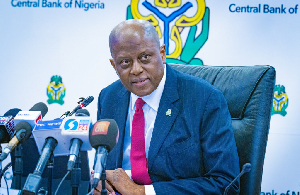The Institute of Chartered Accountants of Nigeria (ICAN) has appraised the country’s renewable energy sector, saying it has the potential to create 300,000 jobs and contribute $7.4bn annually to the Gross Domestic Product (GDP) by 2030.
The ICAN’s President, Mallam Haruna Nma Yahaya, spoke at the Institute’s 8th Southern Zonal Conference held in Port Harcourt, Rivers State.
Yahaya further noted that aligning the country’s policies with the United Nations Sustainable Development Goals, particularly Goals 7, 12, and 13, could unlock more than $1trillion in market opportunities for Africa by 2030.
While appreciating the Government of Rivers State for its hospitality, he said: “The renewable energy sector alone has the potential to create over 300,000 jobs and contribute $7.4 billion annually to our GDP by 2030 if properly harnessed.
“Moreover, aligning our policies with the United Nations Sustainable Development Goals, particularly Goals 7, 12, and 13, could unlock more than $1 trillion in market opportunities for Africa by 2030. Eco-disruption, therefore, is not merely a challenge; it is also an invitation to innovation and leadership.
“As chartered accountants, we occupy a unique position at the intersection of finance, governance, and sustainability. We are called to champion the sustainability agenda through improved environmental accounting, sustainability reporting, and innovative green financing mechanisms.
“We can lead the way by promoting ESG disclosures and adopting the International Sustainability Standards Board frameworks, ensuring that our businesses and institutions not only comply with global requirements but also contribute meaningfully to sustainable development”.
Yahaya said integrating climate resilience into budgeting and incentivising eco-friendly investments would allow Nigeria to build a low-carbon economy while attracting green financing and stimulating growth in climate-smart sectors.
“Furthermore, by promoting public-private partnerships for green infrastructure, we can help the nation achieve its Net-Zero Energy Transition Plan,” he added.
He encouraged all members to join the ICAN ESG and Sustainability Faculty to equip themselves with the requisite knowledge and competence to navigate the evolving landscape of environmental, social, and governance reporting, to position the professionals for leadership in the emerging global green economy.
In his keynote address, the Administrator of Rivers State, Vice-Admiral Ibok-Ete Ekwe Ibas (retd), said Nigeria’s sustainability challenges could be overcome by aligning applicable principles of accounting ethics and environmental stewardship.
The administrator indicated that by investing in green skills, civic engagement and being accountable, not only in financial deficits but ecological practices, Nigeria could build a nation that thrived within the global entity.
Expatiating on the theme, ‘Eco-Disruption and Sustainability Challenges: The Way Forward,’ the administrator, represented by the Secretary to the State Government, Prof. Ibibia Lucky Worika, stressed that the topic was timely, especially against the background of recent changes in the world environment.
He said, “Our world is changing. Climate change, deforestation, pollution, and unsustainable consumption patterns are no longer abstract concerns. They are here, disrupting ecosystems, economies, and everyday life from the rising flood waters of the Niger Delta to the advancing desert sands in the north.
“Accountants and Eco-Disruption are an unlikely but vital alliance. It is not every day that you see a room full of accountants discussing eco-disruption. After all, when we think of accountants, we picture balance sheets, not biodiversity; ledgers, not lagoons; profit margins, not mangrove swamps. And yet, here we are about climate change with people whose natural habitat is the spreadsheet.
“I must say, if the planet knew its fate was being discussed by accountants, it might feel strangely reassured or start worrying about whether we are about to amortise the ozone layer.
“But in truth, your role in this conversation is critical. Because sustainable development is not only about planting trees, it’s about restructuring systems. It’s about applying logic, measurement, discipline, and ethics to our collective footprint. These are things accountants excel at”.
Highlighting the negative effects of eco-disruption in the Niger Delta, he said: “In the Niger Delta, where we are gathered today, the evidence is stark: coastal erosion and sea-level rise are threatening entire communities.
“Biodiversity is in decline, with mangrove forests and aquatic life under siege from oil pollution and invasive species. Rainfall patterns are shifting, compromising agriculture, food systems and freshwater supplies.
“Oil spills, bush burning, and deforestation continue to erode environmental health and human livelihoods. These disruptions not only threaten our environment, they destabilise our economy, our security and our very identity as a people.”
Ibas also stressed that strategies to develop effective policy towards environmental stewardship must change to ensure institutional reforms in cognisance of socio-economic, environmental and human sustainability.
He said, “The four pillars of environmental, economic, social, and human sustainability must now guide our policy choices and institutional reforms. We must move from extractive to regenerative systems.
“We must rethink how we produce, consume, and account for the value we create, not just in financial terms, but in ecological and social impact as well.
“Strengthen environmental governance and community engagement, support clean energy with targeted fiscal policies and green financing, promote afforestation and mangrove restoration, integrate sustainability into educational curricula and professional ethics, including accounting practices and invest in data, transparency and inclusive planning at all levels of government and industry”.
Business News of Friday, 8 August 2025
Source: www.thenationonlineng.net













